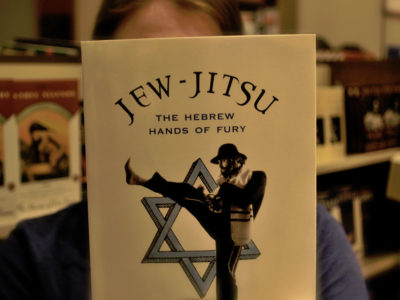CHRISTIANS WHO WANT TO BASH A JEW, with words or inanimate objects, sometimes say it’s okay with God.
They say they see Green Light passages in the Holy Bible.
Igal German points out one of these passages in today’s Bible Question of the Week.
How should Jewish readers today respond to Paul’s words in 1 Thessalonians 2:14-16?
In this passage, Paul was writing a letter of encouragement to Jews who had converted to Christianity. They lived in Thessalonica, a city in what is now Greece. They were suffering through some kind of persecution.
Maybe the same kind of persecution Paul got because of his faith: harsh words, shoved around, beat up, thrown in jail, stoned. Maybe they had their businesses boycotted by fellow Jews.
Whatever was going on, Paul reminded them they were in good company. They were being mistreated in the same way Jews mistreated Jewish converts to Christianity in what is now Israel.
Hardcore Jews did even worse, Paul said:
- “Jews killed the Lord Jesus and the prophets, and they even chased us away. God doesn’t like what they do,” (1 Thessalonians 2:15).
Here’s where some people see the Green Light to clobber Jews:
- “The Jews have always gone too far with their sins. Now God has finally become angry and will punish them,” (1 Thessalonians 2:16).
So some folks say they think of themselves as the hand of God administering justice to a sinful race of people. Many Nazi Germans made that argument as a defense for the Holocaust.
There’s a reason the first Christians didn’t think like that.
It’s because they were – Jews.
That actually comes as a surprise to some Christians today.
Jesus was a Jew.
Paul – the man writing this letter that criticizes Jews – was a Jew.
Pick the name of almost any human being in the New Testament. Jew.
Paul was not criticizing the entire Jewish race. He was not declaring a divine curse on all descendants of Abraham. He was not issuing a license to kill.
He was telling a few members of a tiny church in a distant country to hang in there in spite of what Jews in the local synagogue were putting them through. He was not declaring a Crusade, a jihad, or a holocaust.
Writing a letter to another persecuted congregation, Paul told them to “Do your best to live at peace with everyone,” (Romans 12:18).
So, what about the question: how should Jewish readers today respond to Paul’s criticism of Jews?
Personally, I would recommend lyrics from a 1964 song by Bob Dylan, a Jew:
“It ain’t me, babe. No, no, no, it ain’t me, babe. It ain’t me you’re looking for, babe.”



Leave a Reply